
Stem Cell Research & Therapy
Scope & Guideline
Pioneering Research in Regenerative Therapies
Introduction
Aims and Scopes
- Stem Cell Characterization and Mechanisms:
Research articles often explore the biological characteristics, differentiation potential, and mechanisms of action of various types of stem cells, including mesenchymal stem cells (MSCs), induced pluripotent stem cells (iPSCs), and other progenitor cells. - Therapeutic Applications of Stem Cells:
The journal publishes studies on the clinical applications of stem cells in treating a variety of diseases and conditions, such as autoimmune disorders, cardiovascular diseases, and neurological conditions, emphasizing their potential in regenerative medicine. - Extracellular Vesicles and Secretome:
A significant focus is placed on the role of stem cell-derived extracellular vesicles and secretomes, highlighting their therapeutic potential in modulating immune responses, enhancing tissue repair, and their applications in drug delivery. - Innovative Techniques in Stem Cell Research:
The journal features advancements in methodologies for stem cell isolation, culture, and differentiation, including bioprinting, 3D culture systems, and genetic engineering techniques like CRISPR/Cas9. - Interdisciplinary Approaches in Stem Cell Therapy:
Research often integrates approaches from molecular biology, immunology, and bioengineering to address challenges in stem cell therapy, including issues related to cell survival, engraftment, and immune modulation.
Trending and Emerging
- Regenerative Medicine and Tissue Engineering:
There is a growing emphasis on the use of stem cells in regenerative medicine and tissue engineering, with numerous studies focusing on their ability to repair and regenerate damaged tissues and organs, particularly in orthopedic and cardiovascular applications. - Stem Cell-Derived Exosomes and Their Therapeutics:
Research on exosomes derived from stem cells is rapidly increasing, highlighting their potential as a cell-free therapeutic strategy for various diseases, including cancer, cardiovascular diseases, and neurodegenerative conditions. - Immunomodulatory Properties of Stem Cells:
The immunomodulatory effects of stem cells, especially in the context of inflammatory diseases and transplant rejection, are gaining attention, as studies explore how stem cells can modulate immune responses to enhance therapeutic outcomes. - Personalized Stem Cell Therapies:
There is a trend towards personalized approaches in stem cell therapies, including the use of patient-derived iPSCs to create tailored treatments for individual patients, particularly in genetic disorders and cancer. - Stem Cell Therapy for COVID-19 and Other Acute Conditions:
The journal has seen an increase in research focusing on the application of stem cell therapies in treating COVID-19 and other acute conditions, exploring their potential in immune modulation and tissue repair.
Declining or Waning
- Traditional Stem Cell Sources:
There has been a noticeable decrease in studies focusing on traditional sources of stem cells, such as bone marrow and embryonic stem cells, as research increasingly shifts towards more versatile and ethically favorable sources, such as iPSCs and MSCs from various tissues. - Basic Stem Cell Biology:
Research that solely focuses on basic stem cell biology without direct clinical applications appears to be declining. The trend is moving towards more translational studies that emphasize therapeutic implications and clinical outcomes. - End-of-Life Applications of Stem Cells:
The exploration of stem cell therapies for end-of-life conditions has decreased, as the journal emphasizes more on regenerative applications and therapeutic interventions that can significantly improve patient outcomes.
Similar Journals

Stem Cell Reviews and Reports
Unlocking Innovations in Cell Biology and CancerStem Cell Reviews and Reports is a prestigious journal published by SPRINGER specializing in the dynamic field of stem cell research, encompassing various aspects of cell biology and cancer research. With an ISSN of 2629-3269 and E-ISSN of 2629-3277, this journal serves as an essential resource for academics, offering insightful reviews and cutting-edge reports from 2009 to 2024. The journal has achieved a commendable Q2 ranking in both Cancer Research and Cell Biology categories as of 2023, highlighting its significant contribution to the scientific community. Additionally, with Scopus rankings placing it in the 74th percentile for both biochemistry and cell biology, it is recognized for its high-quality articles that foster innovative approaches in stem cell therapy and regenerative medicine. As an Open Access publication, Stem Cell Reviews and Reports ensures that its comprehensive content is readily available to researchers, professionals, and students, promoting collaboration and advancement in this vital area of study.
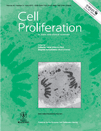
CELL PROLIFERATION
Shaping the Future of Medicine Through Cellular InsightsCELL PROLIFERATION, published by Wiley, is a leading open-access journal that has been at the forefront of research since its inception in 1968. With an impact factor that solidifies its position in the Q1 category of both Cell Biology and Medicine (Miscellaneous), this journal serves as a premier platform for disseminating groundbreaking studies in the field of cellular and molecular biology. The journal is renowned for its rigorous peer-review process and comprehensive coverage of topics related to cell growth, division, and differentiation, making it an invaluable resource for researchers, professionals, and students alike. With its notable Scopus ranking of #30 in Biochemistry, Genetics, and Molecular Biology: Cell Biology, and a robust open access model since 2019, CELL PROLIFERATION ensures that cutting-edge research is accessible to a global audience, fostering collaboration and innovation across the scientific community. Located in the United Kingdom, the journal remains committed to enhancing the understanding of cellular processes, thereby influencing developments in medicine and biotechnology.

Current Stem Cell Research & Therapy
Exploring Innovative Therapies for Tomorrow's MedicineCurrent Stem Cell Research & Therapy, published by Bentham Science Publishers Ltd, is a leading journal dedicated to advancing the field of stem cell research. With an ISSN of 1574-888X and an E-ISSN of 2212-3946, this journal has been a valuable resource since its inception in 2006 and continues to broaden its scope through 2024. Recognized in the Q2 quartile for Medicine (miscellaneous) and ranked in the 66th percentile among its peers, the journal plays a crucial role in disseminating high-quality, peer-reviewed research that explores both the therapeutic and biological implications of stem cells. Located in the United Arab Emirates, Current Stem Cell Research & Therapy embraces a global audience of researchers, professionals, and students, providing a vibrant platform for discourse and innovation. While the journal offers subscription-based access, it remains committed to enhancing the scientific community's understanding of stem cell therapy and its applications across various medical fields.
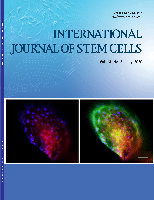
International Journal of Stem Cells
Connecting Researchers to Groundbreaking Stem Cell ScienceThe International Journal of Stem Cells is a distinguished peer-reviewed journal dedicated to advancing the field of stem cell research. Published by the Korean Society for Stem Cell Research, this journal has established itself as a vital source of high-quality research since its inception in 2008. Operating under the ISSN 2005-3606 and E-ISSN 2005-5447, the journal caters to a global audience, featuring works that span a diverse array of topics within Cell Biology and Developmental Biology. It is noteworthy that as of 2023, the journal is ranked Q3 in Cell Biology and Q2 in Developmental Biology, highlighting its growing influence and credibility in the scientific community. Given its commitment to facilitating open scientific communication, it is crucial for researchers, professionals, and students to engage with the rigorous research published in this journal as it profoundly impacts the understanding and application of stem cell science. With accessibility to a wealth of innovative studies, the International Journal of Stem Cells remains an indispensable resource for anyone interested in the transformative potential of stem cell research.
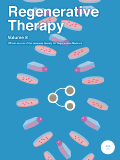
Regenerative Therapy
Pioneering research in regenerative therapy for a healthier tomorrow.Regenerative Therapy is a premier open-access journal dedicated to advancing the fields of biomaterials, biomedical engineering, and developmental biology. Published by Elsevier in Japan, this journal has been an influential platform since its inception in 2015, contributing significantly to the global discourse on regenerative medicine. With an impressive Q2 ranking in major categories such as Biomaterials and Biomedical Engineering, it is recognized for its quality of research and innovation. Researchers seeking to disseminate their findings or explore cutting-edge developments will find Regenerative Therapy to be invaluable, reflecting current trends and fostering collaborations across interdisciplinary boundaries. The journal offers open access, ensuring that high-quality research is available to a broad audience and enhances the impact of scholarly work in the regenerative medicine community.
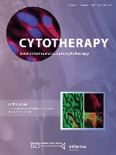
CYTOTHERAPY
Exploring Breakthroughs in Transplantation and Oncology.CYTOTHERAPY is a distinguished journal published by Elsevier Science Ltd, focusing on the critical fields of cell therapy, transplantation, and regenerative medicine. Since its inception in 1999, the journal has established itself as a vital resource for researchers and practitioners, contributing significantly to advancements in Cancer Research, Cell Biology, Genetics, Immunology, and Oncology. With an impressive range of Q2 rankings across multiple categories and a remarkable Q1 standing in Transplantation for 2023, CYTOTHERAPY delivers high-impact research that addresses the evolving challenges in these fields. While the journal does not offer open access, it remains a reputable avenue for disseminating pivotal studies and reviews that push the boundaries of cell-based therapies. Researchers, clinicians, and students alike will find CYTOTHERAPY an indispensable platform to stay abreast of the latest discoveries and innovations that are shaping the future of medical science.

Cells
Empowering Researchers with Open Access to BreakthroughsCells, published by MDPI in Switzerland, is a leading open-access journal that has been disseminating groundbreaking research in the fields of Biochemistry, Genetics, and Molecular Biology since its inception in 2011. With an impressive E-ISSN of 2073-4409, the journal boasts a strong impact factor and ranks in the 84th percentile for Scopus ratings, underscoring its significance in advancing scientific knowledge. As a Q1-ranked journal in both 2023 and 2020, it serves as a premier platform for researchers, professionals, and students eager to explore innovative findings and methodologies. By providing unrestricted access to high-quality research, Cells plays a pivotal role in facilitating collaboration and inspiration within the global scientific community, making it an indispensable resource for anyone interested in cutting-edge discoveries in cellular biology.
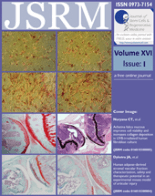
Journal of Stem Cells & Regenerative Medicine
Bridging Research and Clinical PracticeThe Journal of Stem Cells & Regenerative Medicine is a leading publication dedicated to the advancing field of stem cell research and regenerative medicine. Established in India and published by JOURNAL STEM CELLS & REGENERATIVE MEDICINE, this Open Access journal has been available since 2007, providing researchers and practitioners with free and unrestricted access to high-quality articles. With an ISSN of 0973-7154, the journal is indexed in Scopus, featuring a wide array of topics and insights into biochemistry, biotechnology, cell biology, and molecular biology, as denoted by its relevant quartile rankings. This journal is committed to bridging the gap between laboratory research and clinical applications, making significant contributions to the scientific community. The convergence of innovative studies from 2010 to 2024 positions it as an invaluable resource for those looking to stay at the forefront of stem cell and regenerative medicine research.
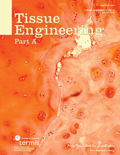
Tissue Engineering Part A
Empowering Scientists to Redefine Regenerative MedicineTissue Engineering Part A is a prestigious peer-reviewed journal published by MARY ANN LIEBERT, INC that focuses on innovative research and advancements within the field of tissue engineering and regenerative medicine. Since its inception in 2008, this journal has played a critical role in disseminating cutting-edge findings that bridge the gap between laboratory research and clinical application, underscoring its significance in the scientific community. With a diverse scope encompassing biochemistry, bioengineering, biomaterials, and biomedical engineering, the journal ranks notably in the Scopus database, holding a Q2 quartile status across multiple categories, thus reflecting its high impact on ongoing research and professional practice. For researchers, professionals, and students, Tissue Engineering Part A serves as an invaluable resource, offering insights into the latest methodologies and breakthroughs that drive the future of healthcare and therapeutic strategies. While primarily a subscription-based journal, it ensures that vital research is accessible to a broad audience of scientists and engineers committed to advancing the life sciences.

Current Stem Cell Reports
Elevating Research Standards in Stem Cell ApplicationsCurrent Stem Cell Reports, published by Springer Heidelberg, is an esteemed academic journal that has emerged as a pivotal resource in the fields of Cell Biology, Developmental Biology, Genetics, and Molecular Biology. Since its inception in 2015, this journal has consistently contributed to the evolving discourse on stem cell research and its applications, providing a platform for innovative studies and reviews through 2024. With a notable impact indicated by its quartile rankings—Q2 in Developmental Biology and Genetics, and Q3 in Cell Biology and Molecular Biology—it engages a diverse audience of researchers, professionals, and students who seek high-quality, accessible research insights. Although offering a traditional access model, the content remains vital for those invested in understanding the implications of stem cell advancements. Located in Switzerland and operating from the heart of Heidelberg, this journal aspires to bridge gaps in knowledge and stimulate collaboration in the burgeoning field of stem cell science.